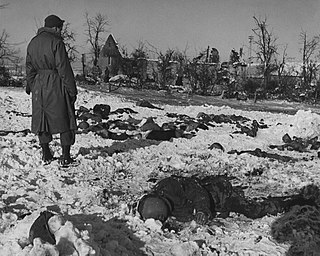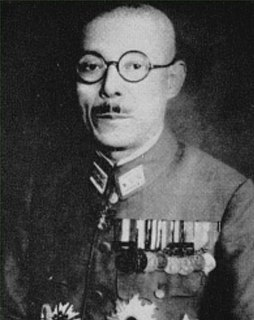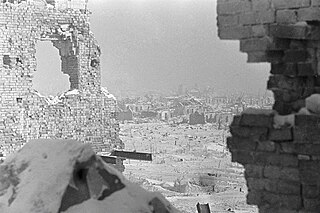Related Research Articles

The Nuremberg trials were held by the Allies against representatives of the defeated Nazi Germany for plotting and carrying out invasions of other countries and other crimes in World War II.

A war crime is a violation of the laws of war that gives rise to individual criminal responsibility for actions by the combatants, such as intentionally killing civilians or intentionally killing prisoners of war, torture, taking hostages, unnecessarily destroying civilian property, deception by perfidy, wartime sexual violence, pillaging, the conscription of children in the military, committing genocide or ethnic cleansing, the granting of no quarter despite surrender, and flouting the legal distinctions of proportionality and military necessity.

Crimes against humanity are certain acts that are purposefully committed by a state, or on behalf of a state, as part of a widespread or systematic policy, typically directed against civilians, in times of war or peace. The violent nature of such acts are considered a severe breaching of human rights, hence the name. They differ from war crimes because they are not isolated acts committed by individual soldiers but are acts committed in furtherance of a state or organizational policy. The first prosecution for crimes against humanity took place at the Nuremberg trials. Initially being considered for legal use, widely in international law, following the Holocaust a global standard of human rights was articulated in the Universal Declaration of Human Rights (1948). Political groups or states that violate or incite violation of human rights norms, as found in the Declaration, are an expression of the political pathologies associated with crimes against humanity.
The Nuremberg principles are a set of guidelines for determining what constitutes a war crime. The document was created by the International Law Commission of the United Nations to codify the legal principles underlying the Nuremberg Trials of Nazi party members following World War II.

Victor's justice is a pejorative term referring to the prosecution of the defeated party's acts in a conflict by the victorious party. Victor's justice generally involves excessive or unjustified punishment of defeated parties and light punishment or clemency for offenses committed by victors. Opponents argue that the difference in rules amounts to hypocrisy and revenge under the guise of retributive justice, leading to injustice, and targets of the label may consider it derogatory.

The International Military Tribunal for the Far East (IMTFE), also known as the Tokyo Trial or the Tokyo War Crimes Tribunal, was a military trial convened on April 29, 1946 to try leaders of the Empire of Japan for crimes against peace, conventional war crimes, and crimes against humanity leading up to and during the Second World War. It was modeled after the International Military Tribunal (IMT) formed several months earlier in Nuremberg, Germany to prosecute senior officials of Nazi Germany.
A war of aggression, sometimes also war of conquest, is a military conflict waged without the justification of self-defense, usually for territorial gain and subjugation.
The Charter of the International Military Tribunal – Annex to the Agreement for the prosecution and punishment of the major war criminals of the European Axis was the decree issued by the European Advisory Commission on 8 August 1945 that set down the rules and procedures by which the Nuremberg trials were to be conducted. This then served as a model for the Tokyo Charter issued months later against the Empire of Japan.

The High Command Trial, also known initially as Case No. 12, and later as Case No. 72, was the last of the twelve trials for war crimes the U.S. authorities held in their occupation zone of Germany in Nuremberg after the end of World War II. These twelve trials were all held before U.S. military courts, not before the International Military Tribunal, but took place in the same rooms at the Palace of Justice. The twelve U.S. trials are collectively known as the "Subsequent Nuremberg Trials" or, more formally, as the "Trials of War Criminals before the Nuremberg Military Tribunals" (NMT).

The Ministries Trial was the eleventh of the twelve trials for war crimes the U.S. authorities held in their occupation zone in Germany in Nuremberg after the end of World War II. These twelve trials were all held before U.S. military courts, not before the International Military Tribunal, but took place in the same rooms at the Palace of Justice. The twelve U.S. trials are collectively known as the "Subsequent Nuremberg Trials" or, more formally, as the "Trials of War Criminals before the Nuremberg Military Tribunals" (NMT).
World War II officially ended in Asia on September 2, 1945, with the surrender of Japan on the USS Missouri. Before that, the United States dropped two atomic bombs on Japan, and the Soviet Union declared war on Japan, causing Emperor Hirohito to announce the acceptance of the Potsdam Declaration on August 15, 1945, which would eventually lead to the surrender ceremony on September 2.

Heitarō Kimura was a general in the Imperial Japanese Army. He was convicted of war crimes and sentenced to death by hanging.

Command responsibility, also called superior responsibility, the Yamashita standard, or the Medina standard, is the legal doctrine of hierarchical accountability for war crimes. At its core, the doctrine stipulates that a superior, defined as a military commander or a civilian leader, can be held responsible for war crimes committed by subordinates. The Command responsibility doctrine has been leveraged in various international tribunals to hold military and civilian leaders accountable for war crimes

A crime of aggression or crime against peace is the planning, initiation, or execution of a large-scale and serious act of aggression using state military force. The definition and scope of the crime is controversial. The Rome Statute contains an exhaustive list of acts of aggression that can give rise to individual criminal responsibility, which include invasion, military occupation, annexation by the use of force, bombardment, and military blockade of ports. Aggression is generally a leadership crime that can only be committed by those with the power to shape a state's policy of aggression, rather than those who carry it out.
There are differences from one country to another regarding the definition of Japanese war crimes. War crimes have been broadly defined as violations of the laws or customs of war, which include crimes against either enemy combatants or enemy non-combatants. War crimes also included deliberate attacks on citizens and property of neutral states as they fall under the category of non-combatants, as at the attack on Pearl Harbor. Military personnel from the Empire of Japan have been accused and/or convicted of committing many such acts during the period of Japanese imperialism from the late 19th to mid-20th centuries. They have been accused of conducting a series of human rights abuses against civilians and prisoners of war (POWs) throughout east Asia and the western Pacific region. These events reached their height during the Second Sino-Japanese War of 1937–45 and the Asian and Pacific campaigns of World War II (1941–45).
Otto Heinrich Kranzbühler was a German naval judge who represented defendant Grand Admiral Karl Dönitz before the International Military Tribunal at the Nuremberg Trials.
A war crimes trial is the trial of persons charged with criminal violation of the laws and customs of war and related principles of international law committed during armed conflict.

Superior orders, also known as the Nuremberg defense or just following orders, is a plea in a court of law that a person, whether a member of the military, law enforcement, a firefighting force, or the civilian population, should not be considered guilty of committing actions that were ordered by an superior officer or official.
The Commission on the Responsibility of the Authors of the War and on Enforcement of Penalties was a commission established at the Paris Peace Conference in 1919. Its role was to examine the background of the First World War, and to investigate and recommend individuals for prosecution for committing war crimes.

The French Permanent Military Tribunal in Saigon, also known as Saigon Trials was a war crimes tribunal which held 39 separate trials against suspected Japanese war criminals between October 1946 and March 1950. Its scope was limited to war crimes committed against the French population of French Indochina after the Japanese coup d'état in French Indochina. Shifts in French foreign policy during the Cold War and disruptions caused by the First Indochina War caused the number of convictions to dwindle. As judges opted to discontinue criminal charges against the defendants or commuted their sentences.
References
- 1 2 M. Cherif Bassiouni (July 27, 1999). Crimes Against Humanity in International Criminal Law. Wolters Kluwer. p. 32.
- ↑ Nuremberg Trials Final Report Appendix D: Control Council Law No. 10